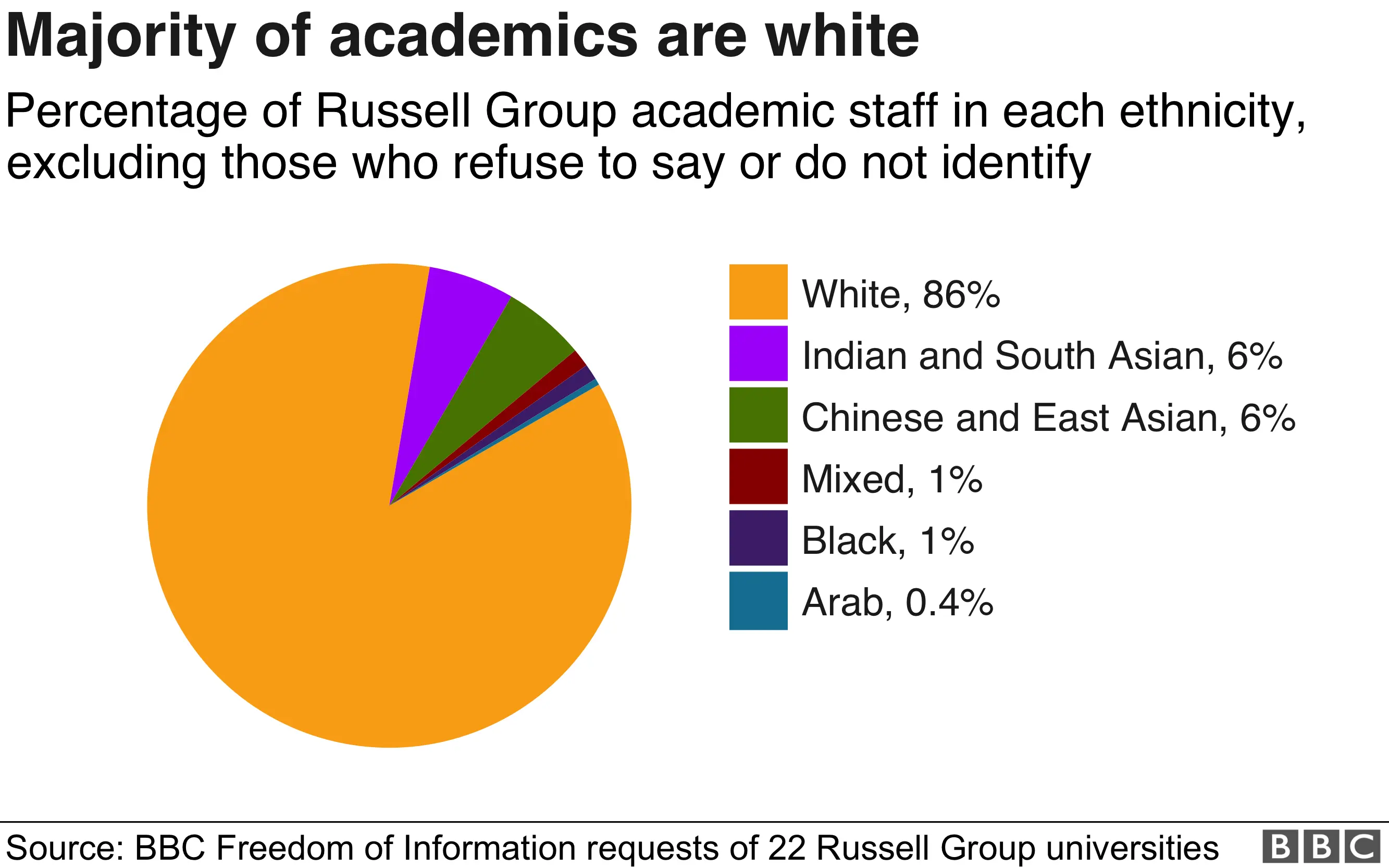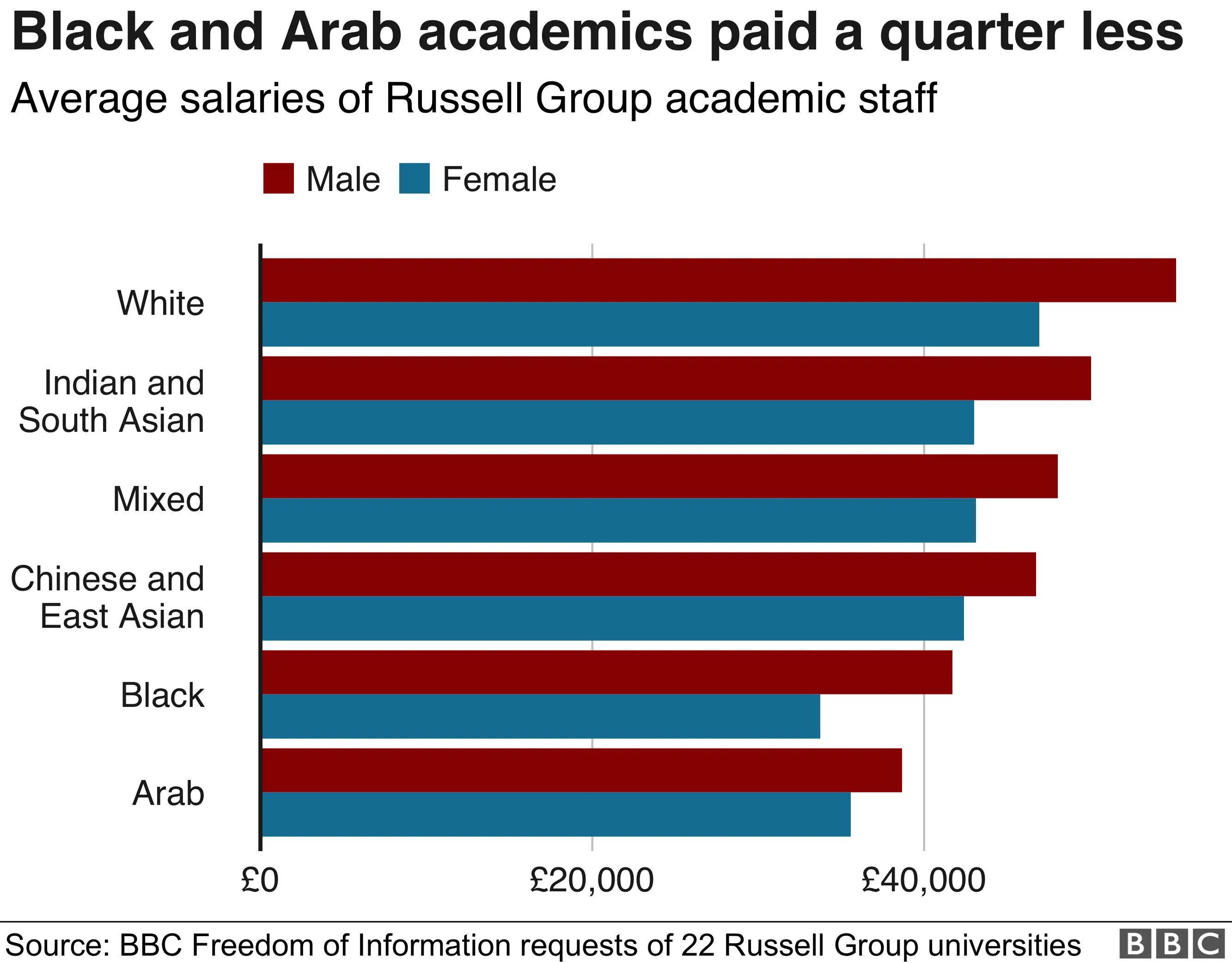Ethnic minority academics earn less than white colleagues
 BBC
BBCWhen Meenakshi Sarkar landed a job as a teaching fellow at Leeds University after a successful career in business in India, she was delighted.
But the university put her on the lowest possible academic pay band, leaving her struggling financially.
It became clear that colleagues were paid more for similar work, leaving her feeling "depressed and devalued".
"I feel like everyone else is running a 100m sprint and I'm running a steeplechase alongside them," she says.
"It's not an equal race."
Ms Sarkar's frustration is not unusual, according to data obtained by BBC News under Freedom of Information law.
The BBC sent FOI requests to all 24 universities in the Russell Group of highly selective, research-based universities, and 22 responded.
At these universities, the data showed average salaries of:
- £52,000 for white academics
- £38,000 for black academics
- £37,000 for academics from an Arab background
This means that black and Arab academics at the UK's top universities earn an average 26% less than white colleagues.
And female academics fare even worse, with an ethnicity pay gap on top of the gender pay gap.

The pay gap is smaller for other Asian and mixed-heritage academics.
The Russell Group said it was unable to comment on individual universities' recruitment practices.
But Leeds University said it took the issue "very seriously".
"This is why we are committed to ensuring that black and minority ethnic staff are employed at all levels and to reducing any pay gap arising from our current representation across the grades."
Pay gaps can be caused by unequal pay, which is illegal, or by a group of staff tending to be in lower paid jobs or in part-time work.
The new data suggests that ethnic minority academics are less likely than white men or women to be promoted to better paid, senior positions.
They also tend to be in lower pay bands.
The data shows the gender pay gap is more pronounced for ethnic minority women at Russell Group universities where white male staff are on average salaries of £55,000.
On average, compared with white men:
- white women got 15% less
- Asian women, 22% less
- black women, 39% less

Prof Akwugo Emejulu, of Warwick University, is one of just 26 black women professors in the UK.
She says she attained her current position in the sociology department at Warwick University despite experiencing "racist and sexist bullying" throughout her career.
"One of the reasons for the gap is that black women in particular tend to be on temporary teaching-only contracts that trap them in low waged work with few opportunities to move on to permanent positions," she told the BBC.
The BBC data shows that at Warwick, ethnic minority academics are paid an average 25% less than their white colleagues, amounting to over £14,500.
White academics at Warwick receive an average salary of £59,000 but the 215 identifying as Asian get 27% less and the 25 black academics earn 39% less.
But the university says its own analysis shows the gap is in fact just 15.5% although it agrees "there is much room for improvement".
"We at Warwick are actively looking at the best ways to identify where the barriers are to help us reduce the ethnic minority pay gap."
The university says the approach is paying off, with 28% of its early career academic staff identifying as black or minority ethnic.
The former Universities Minister and Labour MP for Tottenham David Lammy said the figures showed universities needed to "take a look in the mirror and realise that more needs to be done to both widen access at undergraduate level and to keep and retain a diverse cohort right through to PhDs, professorships and the very top of these institutions".
Across the Russell Group universities that responded, the BBC found that there are:
- More than 49,000 White academic staff
- Three thousand Chinese and East Asian
- Three thousand Indian and South Asian
- Just over 600 Black and only 250 from Arab backgrounds
Disclosing ethnicity is not mandatory and about one in six academic staff had refused to declare their ethnicity to their employers so their data is not included.
The figures disclosed to the BBC came as the government revealed plans to make ethnicity pay reporting mandatory for companies with more than 250 employees.
This story has been updated as initial data provided by Glasgow University was incorrect.
Additional reporting by William Dahlgreen and Maryam Ahmed
